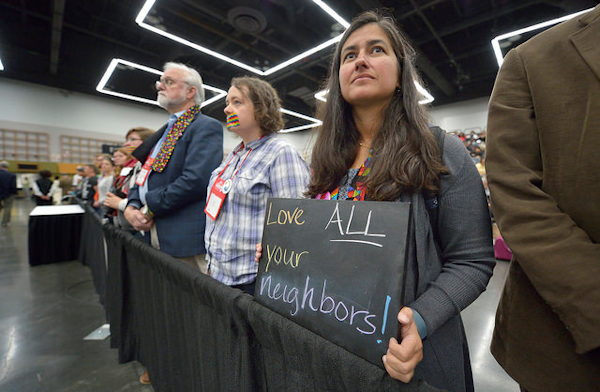A Reserve Delegate describes a significant conversation that took place in the “Peanut Gallery” and offers a prayer of hope.
LAURA SPEIRAN
Clergy Reserve Delegate, Detroit Conference
As soon as I began telling people I was going to General Conference, I had people ask me why I would choose to subject myself to the stress of the experience. Our denomination has been in a tangle of controversy over human sexuality for decades, and it is a painful and emotional debate. My response each time was that I had prayed for God’s leading and feel called to be here. I even chose to observe the Church and Society 2 Legislative Committee, which received all of the petitions having to do with human sexuality, and specifically to sit in on the human sexuality sub-committee.
It is a challenge to be a mere observer, to not have any say in the discussion or how the petitions before the committee are handled. So, I was grateful when I struck up a conversation with a man next to me in the “peanut gallery,” as we lovingly refer to the section for observers. We talked about how disappointing it was that General Conference had voted down Rule 44, which would have allowed for small group discussion to take place around the issues of human sexuality. Still, it was a surprise when he said to me and the two people next to me, “I’m gay, and I would love to have a conversation about who we are as people and what we believe.” The woman next to me said, “Right here? Right now?” And the conversation proceeded! She explained that she loves all people and knows lots of people who are gay, but believes that it is a sin, and that it is also a choice. The fourth person explained that he believes it is against the Bible, and that as God’s followers it is our job to obey what is there. I explained that I have been on a journey for a lot of years to try to understand and come to a place where I could articulate what I see as a huge paradigm shift for all of humanity to understand itself.
My journey began when I went off to college, away from my small town Michigan home. I was randomly placed into what was referred to as the “gay dorm” that year on campus. Having never encountered homosexuality before, it was a lot to take in. As the years went by, I had more and more conversation with friends who were questioning their sexuality. I watched documentaries on TV and read articles on how it is not a choice, but is part of our humanity. Still, I struggled. When I entered seminary, the first book I read was W. Paul Jones’ Theological Worlds. In it, he describes the five different groupings all Christians fall into when explaining God and how they understand salvation, Jesus Christ, atonement, etc. They are all represented in the Bible, all represented in our hymnal, but all different. In my naiveté, I had been assuming there was one “right” answer, and that everyone else was wrong. This finally gave me a brand new understanding that changed everything… diversity is God-ordained. We don’t have to be afraid of it. Look around our world! Could it be that diversity includes sexuality? Gender? I believe it not only can, but must.
The fourth person in the conversation in the peanut gallery had the immense courage to say, “but I could be wrong.” I thanked him for that, and then had a good look at myself. Could I say the same thing? I believe that biblical interpretation must be contextual, at least on some levels. Otherwise, slavery would be okay, and women would not be allowed to preach. For me to be wrong would be to deny who I am—a woman called to preach. A thought, unbidden, came to my mind with shocking force: I would rather not live than not be acknowledged as the person God made me to be. Immediately I was drawn to the parallel of my brothers and sisters in Christ who are LGBTQI. No wonder suicide is such a risk! It is indeed, their very existence at stake when the church chooses to say “incompatible.”
The subcommittee on human sexuality was diverse at this General Conference, but not balanced. There were many members from central conferences in Africa. Where I have been struggling with this journey of understanding human sexuality for over 30 years, people on the committee may not even understand that there is a journey at all. Questions were asked throughout the proceedings: What does sexual orientation mean? What does gender identity mean? How can we even begin to explain in the context of legislative committee meetings and plenary sessions?
The journey is a long one, for individuals, for our society, for the church, for humanity itself, filled with confusion and mistrust and also hope for a new future, when we will value people as people, not for how they fit into comfortable patterns that make more sense to us. The plenary sessions are yet to come when some of the inclusive petitions struck down in committee will be brought to the floor anyway, in the hope of making a new day for our church, and for the people within it. On this day of Pentecost, I pray for the Holy Spirit to guide us and give us courage for the journey.
Last Updated on May 16, 2016

